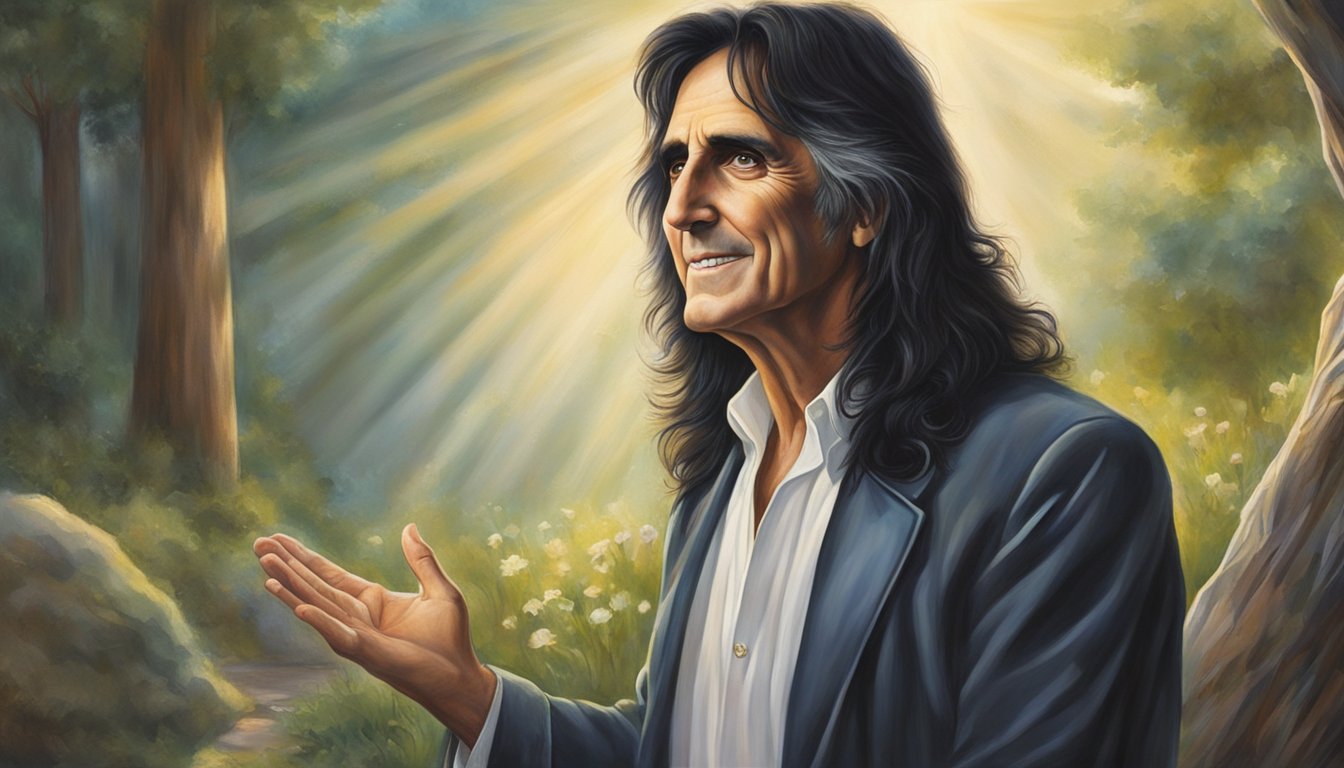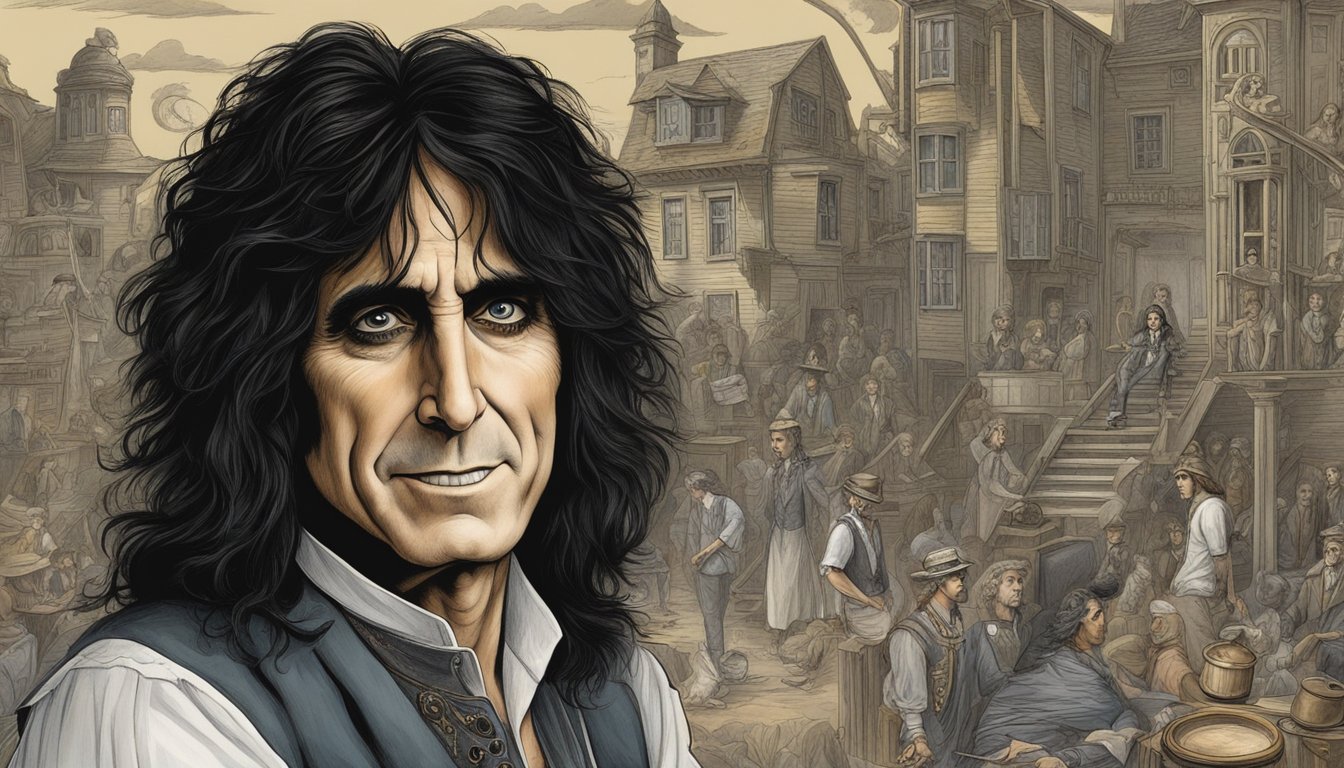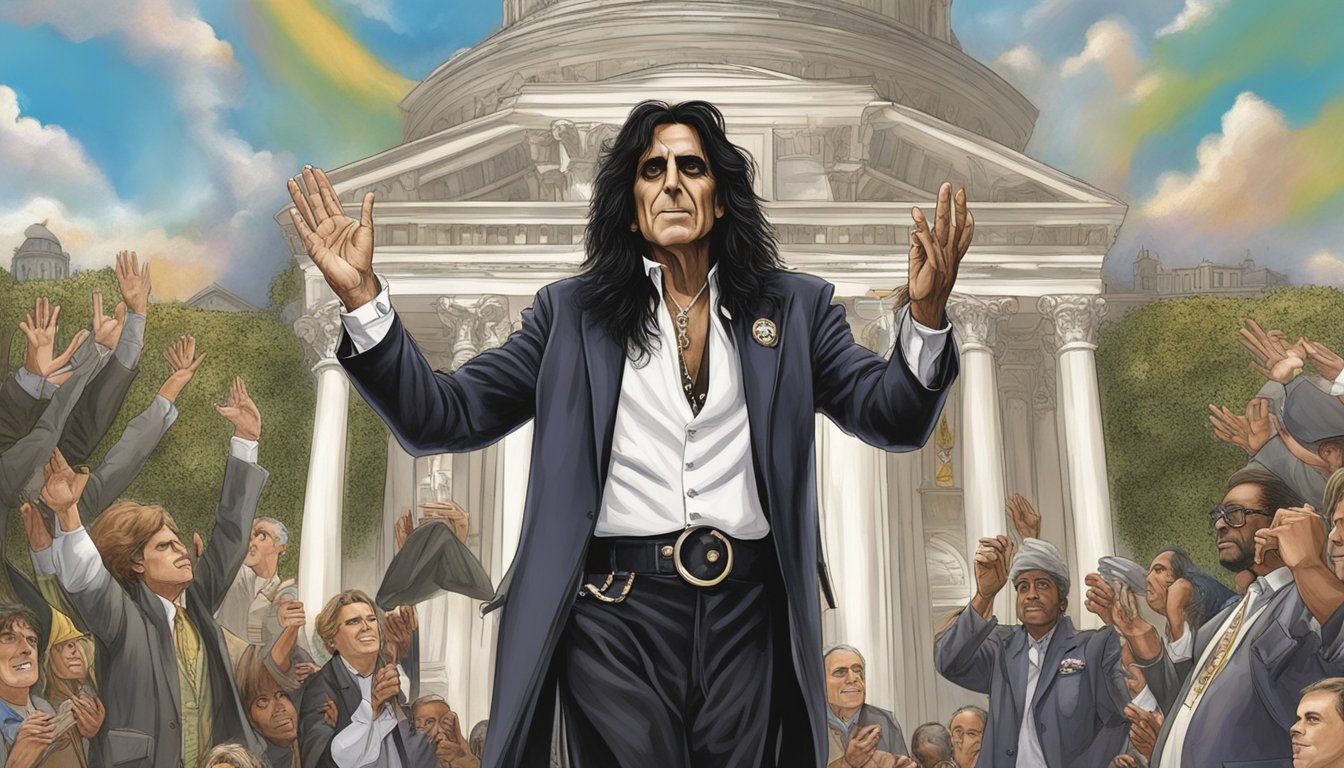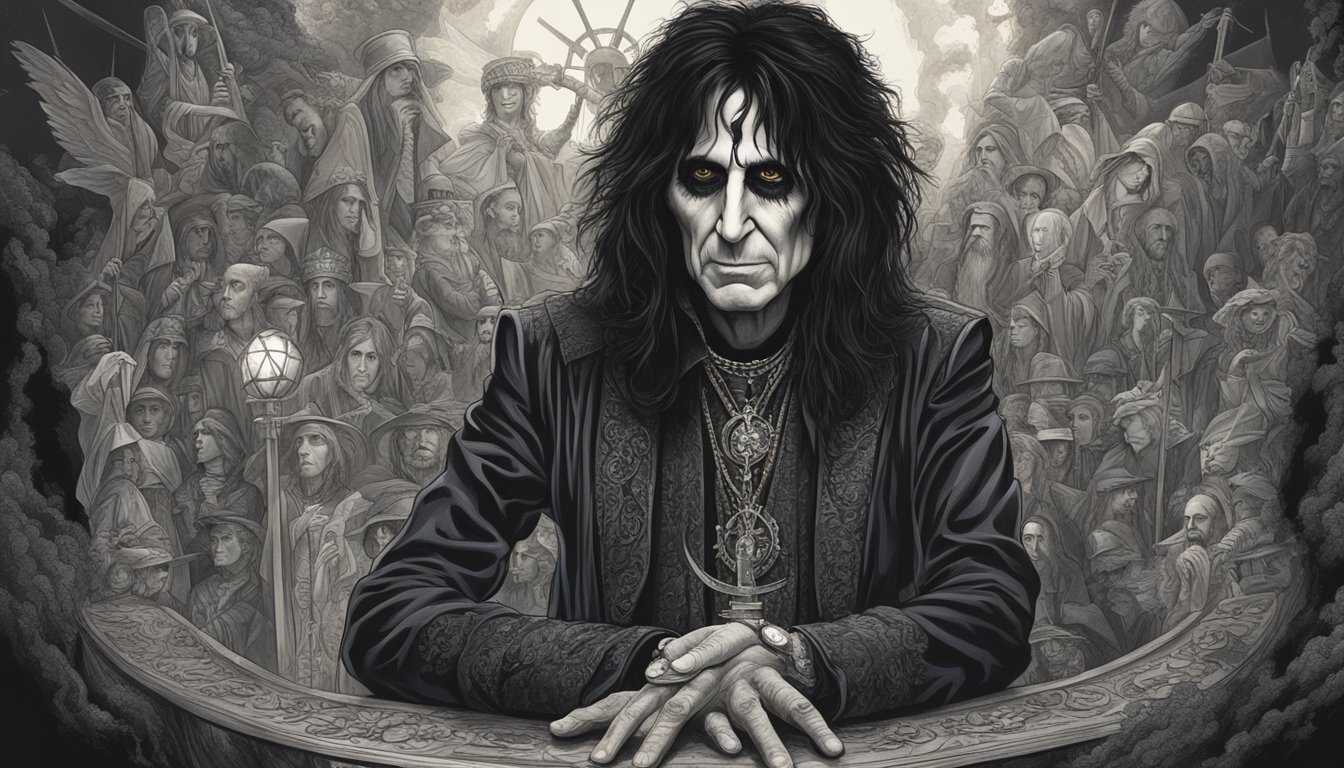Alice Cooper, the legendary shock rock star known for his theatrical performances and groundbreaking music, experienced a profound transformation that led him to embrace Christianity. His journey to faith started in the late 1980s after struggling with issues of alcoholism and the rock and roll lifestyle that often pushed the boundaries of societal norms. It was during this turbulent period that Cooper turned away from the excesses of fame and found solace in Christianity, fully committing to his new path and attributing his sobriety to his spiritual awakening.
Let’s get into the details of our question: when did Alice Cooper become a Christian?

When Did Alice Cooper Become a Christian?

In the years that followed his commitment to Christianity, Cooper has been vocal about his faith, often highlighting the compatibility of being both a rock star and a devout Christian. Despite his dark stage persona, he maintains a clear distinction between his performance art and personal beliefs, with his faith playing a vital role in both his private life and professional career. His public declaration of Christianity also had a substantial influence on his lifestyle, impacting the way he handled fame and his interactions within the music industry.
Key Takeaways
- Alice Cooper embraced Christianity in the late 1980s amid personal struggles.
- Cooper openly reconciles his rock star persona with his devout Christian life.
- His faith has significantly influenced his approach to his music career and personal conduct.
Early Life and Musical Beginnings

Alice Cooper, renowned for his dramatic flair and rebellious image in rock and roll, began his journey in the world of music during his high school years. His rise to stardom was marked by the creation of an iconic persona that deeply influenced the genre.
Rise to Fame

In the mid-1960s, a young Alice Cooper, originally Vincent Furnier, found his calling in music. He formed his first band during his high school days, igniting the spark that would lead to a legendary career in rock and roll. They made a notable entrance into the music scene, catching the eye of prominent figures, including guitarist Frank Zappa, who saw potential in the band’s unique style and stage presence.
Creating the Alice Cooper Persona
The Alice Cooper personage came to life in the late 1960s, a concoction of horror, vaudeville, and rock designed to jolt the very norms of the era’s music industry. It was more than just a stage act; it became an alter ego for the singer—a rebel with a cause that turned heads and stirred conversation. This carefully crafted character, draped in dark eye makeup and snake-adorned costumes, was pivotal in Alice’s journey to stardom, resonating with a generation eager for something beyond the conventional.
Personal Struggles and Turning Points
Before Alice Cooper’s transformation into a devout Christian, he faced numerous personal struggles, most notably with addiction. These battles with substance abuse would eventually lead to a pivotal health crisis that played a significant role in his spiritual revelation.
Battles with Addiction
Alice Cooper became notorious for his heavy drinking habits as part of his rock and roll lifestyle. His addiction to alcohol was well-documented, and over time, the legendary rocker also started grappling with drug use, including cocaine. This period was marked by extreme excess and put him at risk both physically and mentally.
Health Crisis and Revelation
A serious health crisis would become the wake-up call Cooper needed. The cumulative effects of years of alcoholism and drug abuse took a toll on his liver, leading him to a much-needed stay at the hospital. This critical moment led to a profound personal revelation that his life needed to change. It was this realization that set the stage for his commitment to Christianity in the late 1980s, a commitment that has been credited with saving his life from addiction. Alice Cooper found solace and a new path in his faith after years of substance abuse.
When Did Alice Cooper Become a Christian?
Alice Cooper’s transformation to a devout Christian was marked by a personal encounter with Christianity and supportive relationships with family and friends. These influences were pivotal in his decision to embrace faith in Christ as a cornerstone of his life.
Encounter with Christianity
In the late 1980s, after years of substance abuse, Alice Cooper had a significant encounter with Christianity that led him to a dedicated Christian life. This period was crucial as he searched for meaning and solace beyond his stage persona. Cooper’s engagement with Christianity offered him a new foundation, finding solace in the Bible and its teachings. This experience was instrumental in his conversion and eventual proclamation of faith, providing a stark contrast to his shock rock image.
Influence of Family and Friends
Cooper’s journey was strongly shaped by the influence of those close to him. His family, particularly his wife Sheryl, played a key role in steering him towards a spiritual path and encouraging his exploration of the Christian faith. Additionally, relationships with friends who were practicing Christians, combined with the mentorship of religious figures like pastors, reinforced his transition. Through these relationships, Cooper saw the embodiment of Christian principles in action and the transformative power of living a life centered on Jesus and God’s teachings.
Public Declaration of Christian Faith
Alice Cooper, often hailed as the Godfather of Shock Rock, has been vocal about his Christian faith. His transformation from a life of rock and roll excess to one of religious devotion has been public and profound, marked notably through interviews and personal testimonies.
Interviews and News
Alice Cooper’s journey to embracing Christianity was shared in candid interviews with various media outlets. He has spoken about his faith’s significance, explaining how it has reshaped his life and career. Despite his shock rock persona, he has made clear that his faith is genuine, rejecting the notion of any incompatibility between his stage presence and his personal beliefs.
Religious Testimony

Cooper’s testimony reveals a pivotal moment in the late 1980s when he fully committed to Christianity, crediting this change with helping him overcome substance abuse. In his personal story of conversion, Cooper emphasizes the importance of a “one-on-one relationship with Jesus,” stating that this faith saved him from alcoholism. He frequently speaks of the transformational power of religion in his life, advocating that being a Christian is a journey of continual growth and learning.
Alice’s Christian Lifestyle
Alice Cooper’s transition to Christianity has significantly shaped his personal life, integrating core aspects of his faith into his daily routine and creative expressions.
Bible Study and Church Life
Alice Cooper has openly acknowledged the centrality of the Bible and church involvement in his life. He combats the image of rock stardom with a disciplined approach to Bible study, making it a fundamental part of his day. His practice is not just personal; he has often discussed the importance of communal worship and study, as evidenced by his visit to Parkside Church in Cleveland where he spoke on the impact of Christianity in his life.
Religious Practices in Daily Life
Away from the lights and theatricality of rock performances, he practices his Christian faith through prayer, reflection, and emphasis on family values. Alice and his wife share their faith, which strengthens their daily lives and family bond. This transformation has been recognized in interviews where Alice describes his reorientation towards a life of faith following years of substance abuse, as he fully committed to Christianity in the late 1980s. His lifestyle exemplifies the possibility of being both a rock legend and a devout Christian, blending the ethos of his faith with the energy of rock music without compromise.
Impact of Faith on Career
Alice Cooper’s conversion to Christianity brought significant transformations to his life and career, particularly influencing his musical themes and inspiring faith-based projects.
Changes in Musical Themes
Following his commitment to Christianity in the late 1980s, Alice Cooper experienced a notable shift in his musical persona. He retained his edgy rock style but began integrating his faith into his lyrics. This integration of faith and rock was evident in albums like “The Last Temptation,” which included more nuanced messages about good versus evil and personal struggle. While he continued to shock audiences with his stage show, elements of vaudeville, and dramatic flair, the content became less about shock for shock’s sake and more about storytelling with underlying morality.
Faith-Inspired Projects
Cooper’s faith was not just limited to his music but also spilled over into his theatrical endeavors. In 2018, he portrayed King Herod in a televised production of “Jesus Christ Superstar,” allowing him to express his faith through a character in one of the most recognizable biblical stories. He also stayed active in the music scene with the formation of Hollywood Vampires, a supergroup that also included Johnny Depp and Joe Perry. This project, while not overtly religious, offered Cooper a platform to engage with the world of rock without compromising his Christian beliefs.
Alice Cooper’s Family and Faith
Alice Cooper, a legendary rock icon, underwent a profound transformation when embracing Christianity, strongly influenced by his family life. His wife, Sheryl, played a critical role in his faith journey, and together they committed to raising their children with Christian values.
Wife Sheryl’s Influence
Sheryl Goddard, wed to Alice Cooper since 1976, has been a stabilizing force in his life. Their strong bond helped Cooper confront his substance abuse issues and subsequently led him to fully commit to Christianity in the late 1980s. Sheryl’s impact on Cooper’s faith is significant, as he credits her as a catalyst for his spiritual awakening and growth.
Raising Children in Faith
Cooper and Sheryl prioritized a faith-based upbringing for their children, seeking to instil moral values and a sense of spiritual direction from an early age. They ensured that their family life was embedded with Christian teachings, reflecting the importance of faith in their household. Cooper’s role as a father and a Christian exemplifies how his personal beliefs harmonize with his family life.
Advocacy and Charitable Works


Alice Cooper has extended his stage charisma to support various advocacy and charitable initiatives, focusing particularly on youth programs and the promotion of religious freedom. His work benefits communities and provides platforms for personal growth and spiritual exploration.
Supporting Youth and Community
Alice Cooper is the president of Solid Rock, a foundation dedicated to enriching the lives of teens and children in Phoenix. Solid Rock provides a creative sanctuary for youth, where they can engage in music, art, and dance. By offering a supportive environment, Cooper aims to help young people explore their talents and build self-esteem.
Promoting Religious Freedom
In his advocacy for religious freedom, Alice Cooper openly shares his faith journey in interviews, highlighting the impact that becoming a Christian has had on his life. He has had candid discussions with figures like Pastor Greg Laurie, where he reflects on the transformative role of religion and asserts his belief in the importance of religious expression. Through his public conversations, Cooper encourages open dialogue about faith and personal beliefs.
Collaborations and Friendships
Alice Cooper’s journey to Christianity intersected with substantial relationships in the rock world, fostering close collaborations and lifelong friendships with fellow musicians, including the prominent actor and musician Johnny Depp.
Influence Among Musicians
Alice Cooper’s influence in the music industry extends beyond his performances; he has mentored many budding artists and shared meaningful relationships with his peers. These connections often bridged the gap between his iconic shock rock persona and his devout Christian beliefs. Musicians have found inspiration in his ability to balance his faith with his artistry, seeing him as a figure who could stir controversy on stage while nurturing a deep personal spirituality offstage.
Friendship with Johnny Depp

His camaraderie with Johnny Depp is particularly notable. The two met during Depp’s forays into the music industry, where they connected over shared interests and outlooks on life. Their friendship has grown through their mutual involvement in the band Hollywood Vampires, where Alice Cooper’s role in music and faith has notably influenced their collaborative works. Together, they have forged a bond that exemplifies how Alice Cooper’s life experiences can harmoniously coexist with his career as an entertainer.
Reflections on Christianity and Fame
Exploring the intersection of faith and celebrity, Alice Cooper’s journey reveals the complexities of embracing Christianity while living in the spotlight of rock stardom.
Rock Stardom and Religious Beliefs
For many rock stars, the relentless demands of fame can overshadow personal beliefs, but Alice Cooper defied this trend. His profession, replete with its own set of challenges and temptations, juxtaposed sharply with his spiritual awakening. Despite the struggles that often accompany a life under the public eye, Cooper’s turn to Christianity in the late 1980s marked a significant pivot point. This transition can be complex, as the fusion of a rock star persona with devout Christian faith seems contradictory to many. However, Alice Cooper found that the two could coexist, channeling his experiences into a powerful testimony of faith.
Maintaining Faith Amidst Fame
Navigating fame while maintaining a strong faith is not without its difficulties. Alice Cooper found that his celebrity status could serve as a unique platform to express and share his religious convictions. Even in an environment where hard rock and piety seem mutually exclusive, he managed to use his influential position for a larger purpose. His performances, though often characterized as purely for fun, carried a deeper message and underscored his commitment to his beliefs. Cooper’s embodiment of Lord-focused principles in a space traditionally marked by hedonism demonstrates faith’s tenacity even when surrounded by the allures of fame.
Legacy and Cultural Impact

Alice Cooper’s shift into Christianity coincided with his established reputation as the Godfather of Shock Rock, a persona exemplified by his theatrical stage shows involving guillotines and other macabre props. While some may see a dissonance between rock and roll’s rebellious spirit and religious faith, Cooper’s melding of both worlds has had a unique and enduring impact on the cultural landscape.
Influence as the Godfather of Shock Rock

Alice Cooper pioneered a style of performance that merged horror, vaudeville, and rock music, leaving a lasting mark on the genre. His stage shows, complete with props like guillotines, electric chairs, and fake blood, set a new standard for live performances. Cooper’s approach to entertainment opened doors for numerous artists who sought to create a similar blend of theatrics and music, solidifying his title as the Godfather of Shock Rock. This moniker captures not only his innovation but also the broad influence he has had on the performers who have followed in his footsteps.
Christianity in Rock and Roll
Despite the apparent contrast between rock and roll’s rebellious image and religious devotion, Alice Cooper has shown that the two can coexist. His embrace of Christianity softened his personal life while he continued to maintain his dynamic stage persona. Notably, his role as King Herod in the rock opera “Jesus Christ Superstar” highlighted his ability to integrate his faith with his profession. Cooper demonstrated that rock and roll could be a medium for exploring complex themes, including spirituality and faith, without forfeiting authenticity or the edge that defines the genre.
Frequently Asked Questions
This section looks into the transformation of Alice Cooper from a rock icon to a devoted Christian, detailing his spiritual journey, the integration of his faith with his music, and his contributions to religious and philanthropic causes.
What led to Alice Cooper’s conversion to Christianity?
Alice Cooper fully embraced Christianity in the late 1980s, a change primarily spurred by his battle with substance abuse and the search for greater meaning in his life.
How does Alice Cooper incorporate his faith into his music career?
While he continues his work in rock music, Alice Cooper’s faith has influenced the thematic elements within his performances, emphasizing redemption and avoiding conflicts with his religious beliefs.
Does Alice Cooper participate in any faith-based activities or ministries?

He actively engages in Christian outreach; notably, he established the Solid Rock Foundation aimed at helping teens and continues to participate in various Christian events and activities.
What is the history of Alice Cooper’s religious beliefs?
Raised in a Christian household, Alice Cooper drifted away from his early religious upbringing before returning to his faith after personal challenges, cementing his commitment to Christianity.
How has Alice Cooper’s faith influenced his personal life and professional work?
His recommitment to Christianity has profoundly shaped both his personal conduct, focusing on family and sobriety, and his perspective on his role as an entertainer.
Can you tell me about Alice Cooper’s involvement with Parkside Church?
Although not explicitly detailed in the provided context, Alice Cooper’s general involvement with religious communities suggests that he actively participates in church life and supports various faith-based initiatives.












